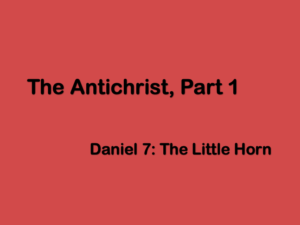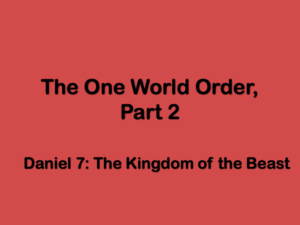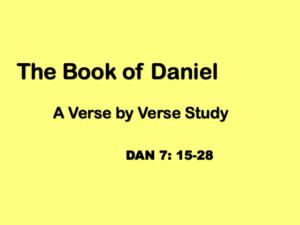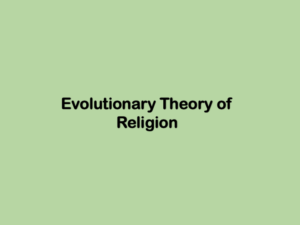What is Futurism? Part 2
In a previous post, we introduced the topic of futurism, a school of interpretation of Biblical end-time prophecy which argues that most Biblical end-time prophecy will be fulfilled in the future. In this post, we further discuss how this belief leads futurists to interpret key events of the end times.

In the last post, we introduced futurism, a school of interpretation of Biblical end-times prophecy. Futurists argue, in contrast to preterits, that most end-times prophecies will be fulfilled in the future, rather than having been fulfilled in the past. In this post, we explore how futurists interpret key end-times topics.
The Kingdom of the Beast and the Antichrist
The Kingdom of the Beast is a global, totalitarian government discussed in Daniel and Revelation. It will initially be established by 10 rulers, but then the Antichrist will arise, destroy 3 of the rulers, and seize power for 7 years. Preterists argue the Kingdom of the Beast was fulfilled by the Roman Empire and Nero (or sometimes Domitian) was the Antichrist.
Preterists agree that the Roman Empire did fulfill some of prophecy in Daniel, most notable the fourth kingdom of Daniel chapter 2 and some elements of the fourth beast of Daniel chapter 7. However, they argue for a future, final kingdom that will fulfill all remaining prophecy. They disagree that Rome had 10 rulers that fulfilled the 10 horns. They also point to several prophecies that Nero did not fulfill as the Antichrist, such as the desecration of the temple, known as the abomination of desolation. Nero also was not defeated by the return of Jesus and the Roman Empire was not replaced by a kingdom ruled by God. While Nero did persecute Christians in Rome, he did not engage in widespread persecution of Christians and Jews as is described in Daniel and Revelation.
While preterists argue that Revelation was written prior to the destruction of Jerusalem in 70 AD, futurists tend to agree with the scholarly consensus, that Revelation was written afterwards, around 95 AD. Consequently, the do not believe that any prophecy in Revelation was fulfilled in 70 AD, but instead look for future events.
The Tribulation
The tribulation is a period of seven years of destruction and judgement. It is first introduced in the seventy-weeks prophecy in Daniel and further fleshed out in Revelation. The seven years will start with some sort of treaty brokered by the Antichrist and will end with the second coming of Jesus. During the tribulation, the world will suffer destruction and death on a scale never seen before, partly from the actions of the Kingdom of the Beast and partly from God’s actions in a series of judgements.
Preterists argue the time tribulation was fulfilled in the years leading up to the destruction of Rome. Futurists point out that period did not last seven years, nor was it destruction on a scale never seen before. Instead, they point to a future seven-year reign of the Antichrist as fulfillment of the tribulation
Replacement Theology
Replacement theology is the belief that the Church replaced Israel in promises, or covenants, that God made to Israel. In effect, God punished Israel for their rejection of the Messiah and has no future plans for Israel. Futurists do not accept replacement theology. They argue that Israel still has a role to play in God’s plan. In the Old Testament, God many several covenants, or promises with the nation of Israel. The first is a promise he made to Abraham, the ancestral progenitor of the entire nation of Israel, in Genesis chapter 12.
Now Yahweh said to Abrahm, “Leave your country, and your relatives, and your father’s house, and go to the land that I will show you. I will make of you a great nation. I will bless you and make your name great. You will be a blessing. I will bless those who bless you, and I will curse him who curses you. All of the families of the earth will be blessed through you.
Genesis 12: 1-3
God selected Abraham as the man through whom God would bring about the Messiah, and through Abraham, God selected Israel as the nation identified a His people, the people through whom he would bring salvation for the entire world. In Genesis chapter 15, Abraham asks for assurance that God will fulfill his promise. In response, God performs a strange ritual.
He said, “Lord Yahweh, how will I know that I will inherit it?”
He said to him, “Bring me a heifer three years old, a female goat three years old, a ram three years old, a turtledove, and a young pigeon.” He brought him all these, and divided them in the middle, and laid each half opposite the other; but he didn’t divide the birds. The birds of prey came down on the carcasses, and Abram drove them away.
When the sun was going down, a deep sleep fell on Abram. Now terror and great darkness fell on him. He said to Abram, “Know for sure that your offspring will live as foreigners in a land that is not theirs, and will serve them. They will afflict them four hundred years. I will also judge the nation, whom they will serve. Afterwar they will come out with great wealth, but you will go to your fathers in peace. You will be buried at a good old age. In the fourth generation they will come here again, for the iniquity of the Amorite is not yet full. It came to pass that, when the sun went down, and it was dark, behold, a smoking furnace, and a flaming torch passed between these pieces. In that day Yahweh made a covenant with Abram, saying, I have given this land to your offspring, from the river of Egypt to the great river, the river Euphrates: the Kenites, the Kenizzites, he Kadmonites, the Hittites, the Perizzites, the Rephaim, the Amorites, the Canaanites, the Girgashites, and the Jebushites.”
Genesis 15: 8-21
The ceremony that God performs is known as the covenant of the parts, and it reflects the format of a treaty between two nations during the time of Abraham. After agreeing to the terms of the treaty, two rulers would walk between the halves of divided animals. The symbolism was that if either of the parties broke the treaty, they would be torn in half like the animals.
It is notable in Genesis 15, that only God passes between to divided animals. By the terms of the covenant of the parts, this means that only God, and not Abraham, was bound by treaty. Futurist interpret this passage as evidence as God’s promise to Abraham was unconditional. This means the Jews will always own the land of Israel, irrespective of their obedience to the terms. They may not always occupy the land, but they will always own it.
Futurists point to the reestablishment of Israel as a nation in 1948 as proof of this interpretation. God did not forever divorce Israel, he only exiled them from the land for a period of time. In fact, under the futurist interpretation of Revelation, Israel has a major role to play.
Rather than the Church replacing Israel in 70 AD, God’s attention switches to the Church as his method of spreading the Gospel. However, during the tribulation and the events leading up to the tribulation, God’s attention switches back to Israel, and it is through Israel that he will complete His plan of salvation for the world.
We will continue to explore the differences between preterism and futurism as we continue to study the Bible. Let us know your thoughts in the comments.







